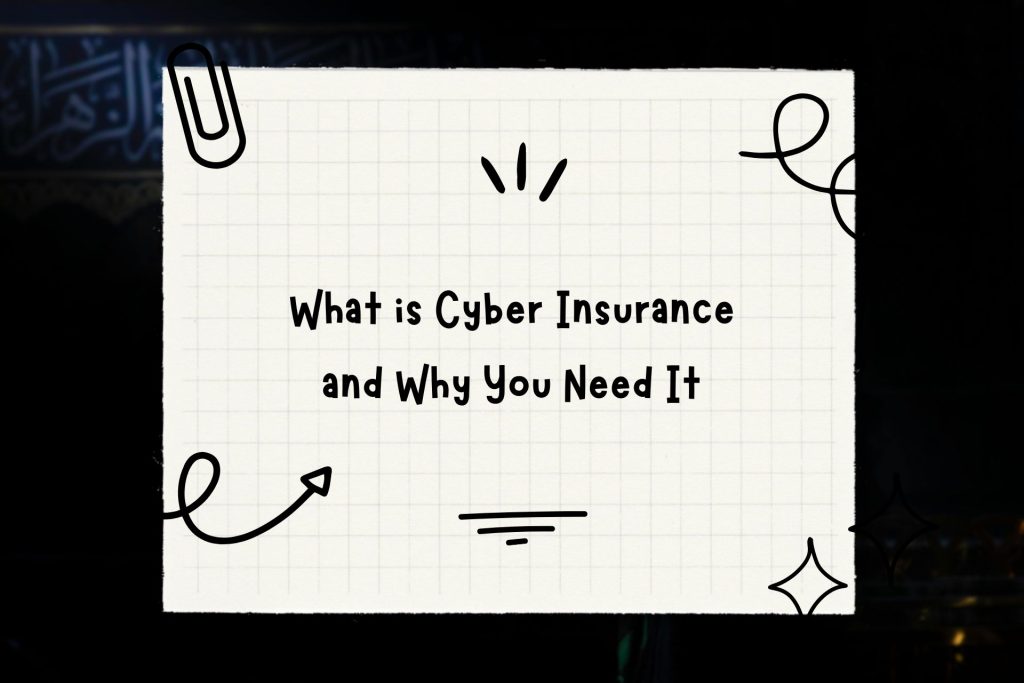In today’s digital economy, the significance of cyber insurance is steadily on the rise.
With businesses and individuals increasingly reliant on technology, the susceptibility to cyber attacks and data breaches amplifies. Cyber insurance stands as a specialized form of coverage that furnishes financial security in the event of a cyber attack or data breach.
These policies encompass a broad spectrum of risks, encompassing data loss, business disruptions, and liability for damages stemming from a cyber attack.
The scope and cost of cyber insurance policies can fluctuate based on factors such as the business size, the nature of stored data, and the associated risk level.
A growing number of businesses are acknowledging the pivotal role of cyber insurance and are opting to invest in policies to fortify themselves against potential cyber threats.
Nevertheless, it’s crucial to recognize that individuals can also reap the benefits of cyber insurance, particularly those who store sensitive information such as personal and financial data online.
In this piece, we will delve into the fundamentals of cyber insurance and underscore its significance for both businesses and individuals.
Definition and Purpose

Cyber insurance is a type of insurance designed to protect businesses and individuals from internet-based risks and losses. It provides coverage for data breaches, cyber attacks, and other cyber-related incidents that can cause financial and reputational damage.
The purpose of cyber insurance is to help businesses and individuals manage the risks associated with cyber threats. Cyber attacks can be costly, and the financial impact can be devastating. Cyber insurance can help mitigate these risks by providing coverage for losses that result from cyber incidents.
Types of Coverage
There are several types of cyber insurance coverage available. Some of the most common types of coverage include:
- Data Breach Coverage: This type of coverage provides protection for the costs associated with a data breach, including notification costs, credit monitoring, and legal fees.
- Cyber Liability Coverage: This type of coverage provides protection for liability claims resulting from a cyber incident, such as a lawsuit filed by a customer or client.
- Network Security Coverage: This type of coverage provides protection for losses resulting from a cyber attack, such as damage to computer systems or lost income due to system downtime.
- Cyber Extortion Coverage: This type of coverage provides protection for losses resulting from cyber extortion, such as ransomware attacks.
It’s crucial to bear in mind that cyber insurance policies exhibit significant variations in terms of coverage and cost. Prior to procuring a policy, it is imperative to meticulously scrutinize the policy, comprehending the extent of coverage and its limitations.
In essence, cyber insurance stands as a pivotal instrument for businesses and individuals to navigate the complexities entwined with cyber threats. By furnishing financial security in the aftermath of a cyber incident, cyber insurance serves as a lifeline, enabling businesses and individuals to recuperate from the financial and reputational fallout stemming from a cyber attack.
Recommended articles
The Importance of Cyber Insurance
As businesses increasingly rely on technology to conduct operations, the risk of cyber attacks and data breaches has become a major concern. Cyber insurance is a type of insurance policy that provides coverage for losses resulting from cyber incidents. In this section, we will discuss the importance of cyber insurance and its benefits.
Risks and Threats
Cyber attacks can come in many forms, such as malware, phishing, ransomware, and denial-of-service (DoS) attacks. These attacks can cause significant damage to a business, including loss of data, system downtime, and reputational damage. Cyber insurance can help mitigate these risks by providing coverage for losses resulting from such incidents.
In addition, businesses face the risk of non-malicious incidents such as human error, system glitches, and natural disasters, which can also result in significant losses. Cyber insurance can provide coverage for these incidents as well, ensuring that businesses are protected against a wide range of threats.
Financial Impact of Cyber Incidents
The financial repercussions of a cyber incident can be substantial. As per an IBM study, the average cost of a data breach in 2020 amounted to a staggering $3.86 million.
This encompasses expenses like legal fees, notification costs, and regulatory fines. Cyber insurance serves as a crucial buffer, offering coverage to mitigate these costs and alleviate the financial strain on businesses.
Moreover, cyber insurance extends its protective reach to encompass coverage for business interruption losses. Such losses may arise when a cyber incident triggers system downtime or other disruptions to business operations.
This facet of coverage plays a pivotal role in aiding businesses to recuperate lost income and curtail the impact of a cyber incident on their financial standing.
In essence, cyber insurance emerges as an indispensable asset for businesses seeking to shield themselves against the escalating peril of cyber attacks and data breaches. By furnishing coverage for a diverse array of incidents and losses, cyber insurance empowers businesses to navigate risks adeptly and swiftly rebound from cyber incidents.
Who Needs Cyber Insurance?
Cyber insurance is not just for large corporations or tech companies; it is essential for any business or individual that uses technology to store or transmit sensitive information. Cyber attacks can happen to anyone, and the consequences can be devastating. Here are two groups of people who need cyber insurance:
Businesses and Organizations
Businesses and organizations of all sizes should consider purchasing cyber insurance. Small businesses are particularly vulnerable to cyber attacks because they often lack the resources to implement robust cybersecurity measures.
However, even large corporations with sophisticated security systems can fall victim to cyber attacks. Cyber insurance can provide financial protection in the event of a data breach or cyber attack, covering the cost of legal fees, damage to reputation, and lost income.
Individuals
For those who rely on technology to store or transmit sensitive information, considering cyber insurance is paramount. This encompasses individuals utilizing online banking, social media, or cloud storage.
Cyber attacks targeting individuals can yield grievous consequences such as identity theft, financial setbacks, and tarnished personal reputation.
Cyber insurance steps in as a safeguard, extending financial protection and aid in the event of a cyber attack, encompassing coverage for legal fees, credit monitoring, and identity restoration services.
In essence, cyber insurance stands as a vital asset for anyone leveraging technology to store or transmit sensitive information. It serves as a safety net, furnishing financial protection and aid in the aftermath of a cyber attack, encompassing coverage for legal fees, reputation damage, and income loss.
Coverage Details
Policy Inclusions
Cyber insurance policies typically cover a range of expenses associated with a cyber attack or data breach. These may include:
- Investigation costs: This can include hiring a forensic investigator to determine the cause and scope of the attack.
- Notification costs: This can include notifying affected individuals, regulatory bodies, and other stakeholders of the breach.
- Legal fees: This can include the cost of defending against lawsuits resulting from the breach.
- Business interruption losses: This can include lost income resulting from the interruption of normal business operations.
- Data recovery costs: This can include the cost of restoring lost or damaged data.
- Extortion payments: This can include payments made to cyber criminals in exchange for the return of stolen data or to prevent further attacks.
Policy Exclusions
While cyber insurance policies can provide valuable protection, it’s important to understand what is not covered. Common exclusions may include:
- Acts of war or terrorism: Many policies exclude coverage for cyber attacks carried out by foreign governments or terrorist organizations.
- Intentional acts: Policies may not cover losses resulting from intentional acts by the insured, such as insider theft or fraud.
- Failure to follow security protocols: If an organization fails to implement reasonable security measures, such as using strong passwords or encrypting sensitive data, the policy may not cover resulting losses.
- Prior known events: Policies may not cover losses resulting from a breach that was known or should have been known prior to the policy’s effective date.
It’s important to carefully review the terms and conditions of a cyber insurance policy to fully understand what is covered and what is not.
Choosing a Cyber Insurance Policy
When it comes to choosing a cyber insurance policy, there are a few key factors to consider. By taking the time to assess your risk profile and compare providers and plans, you can select the policy that best meets your needs.
Assessing Your Risk Profile
Before selecting a cyber insurance policy, it is important to assess your organization’s risk profile. This includes identifying the types of data you handle, the potential impact of a cyber attack, and your current security measures.
Understanding your risk profile enables you to ensure that you select a policy that provides adequate coverage for your specific needs.
Comparing Providers and Plans
Once you have assessed your risk profile, it is important to compare providers and plans to find the best fit for your organization. Some key factors to consider include:
- Coverage: Look for a policy that covers a range of cyber risks, including data breaches, cyber extortion, and business interruption.
- Limits and Deductibles: Consider the limits and deductibles of each policy to ensure that you have adequate coverage in the event of a cyber attack.
- Premiums: Compare premiums across providers to find a policy that fits within your budget.
- Additional Services: Some policies may include additional services, such as risk assessments or incident response planning, which can be valuable for organizations with limited cybersecurity resources.
By carefully assessing your risk profile and comparing providers and plans, you can select a cyber insurance policy that provides the coverage and support your organization needs to stay protected in the event of a cyber attack.
Claims and Compensation
Filing a Claim
When an organization experiences a cyber attack or data breach, it can result in significant financial losses. Cyber insurance can help mitigate these losses by providing compensation for damages. To file a claim, the insured party must first notify their insurer of the incident. The insurer will then assign a claims adjuster to the case who will assess the damages and determine the appropriate compensation.
It is important for organizations to have a clear understanding of the coverage provided by their cyber insurance policy before filing a claim. Some policies may have specific requirements for reporting incidents, such as a time limit for filing a claim or a specific method of notification. Failure to comply with these requirements could result in a denial of the claim.
The Claims Process
Once a claim is filed, the insurer will begin the claims process. This process typically involves an investigation into the incident to determine the extent of the damages and the cause of the breach. The insurer may require the insured party to provide documentation and evidence to support their claim.
Upon the conclusion of the investigation, the insurer will meticulously assess and ascertain the appropriate compensation for the incurred damages.
This compensation may encompass reimbursement for various expenses linked to the incident, ranging from legal fees and forensic investigations to public relations expenses.
Additionally, it may encompass compensation for the income or revenue lost as a consequence of the incident.
In certain scenarios, the insurer may extend additional services aimed at aiding the insured party in recuperating from the incident, such as data recovery or credit monitoring services. These supplementary services hold immense value in mitigating the enduring impacts of a cyber attack or data breach.
Admittedly, the claims process for cyber insurance can prove intricate and time-consuming. Nonetheless, possessing a comprehensive understanding of the process and the coverage offered by the policy can empower organizations to adeptly navigate the process and secure the entitled compensation.
Cyber Insurance Costs
Factors Affecting Premiums
The cost of cyber insurance policies varies depending on several factors. The following are some of the most critical factors that insurance companies consider when calculating premiums:
- Business size: Larger businesses typically pay higher premiums due to the increased risk of a cyber attack.
- Industry: Some industries, such as healthcare and finance, are more susceptible to cyber attacks, resulting in higher premiums.
- Security measures: Companies with robust cybersecurity measures in place, such as firewalls and intrusion detection systems, may receive lower premiums.
- Data sensitivity: Companies that handle sensitive data, such as personal information and financial records, may pay higher premiums due to the increased risk of data breaches.
Ways to Lower Costs
While cyber insurance premiums can be expensive, there are several ways to reduce costs:
- Improve cybersecurity: Implementing robust cybersecurity measures can reduce the risk of a cyber attack and may result in lower premiums.
- Risk assessment: Conducting a comprehensive risk assessment can help identify vulnerabilities and areas for improvement, which can lead to lower premiums.
- Deductibles: Choosing a higher deductible can lower premiums, but it also means that the company will pay more out of pocket in the event of a cyber attack.
- Bundling: Some insurance companies offer discounts for bundling cyber insurance with other policies, such as general liability or property insurance.
Legal and Regulatory Considerations
Compliance Requirements
Cyber insurance policies often come with specific compliance requirements that policyholders must meet in order to be eligible for coverage. For example, a policy may require that the policyholder implement certain security measures, such as firewalls and encryption protocols, or conduct regular security audits. Failure to meet these requirements could result in a denial of coverage in the event of a cyber attack.
Data Breach Laws
Laws regarding data breach notifications vary from state to state and country to country, and non-compliance can lead to substantial fines and legal responsibilities.
Cyber insurance policies offer a way to mitigate these risks by covering legal expenses and fines related to data breaches. However, it’s crucial to meticulously examine the policy to confirm that it encompasses all pertinent legal and regulatory requirements.
Furthermore, it’s essential to understand that cyber insurance policies don’t offer universal protection against all legal and regulatory liabilities.
Policyholders should collaborate closely with their insurance provider and legal advisors to comprehend the precise risks and liabilities they encounter and ascertain that their policy furnishes ample coverage.




